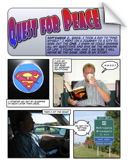In Search of Good Christmas Music
Updated 12/7/2005
So this is Christmas...and the Christmas music is in abundance. It's amazing how many Christmas albums and singles are put out each year. Why, then, can no one seem to name any contemporary Christmas album worth buying?
One reason, I believe, is the roar of the market. It takes a lot of noise to get people's attention, especially in this day and age, and at Christmas, no less. This wasn't a problem even twenty years ago. Two, much of the Christmas music today is overproduced, rushed material hoping to capitalize on a singer's popularity. Three, the best Christmas music always looks to the past and to the standards--it is something in the very nature of the holiday.
With all this in mind, here are some Christmas albums and songs that I’ve discovered over the years that I think are jewels among the coal, along with a few comments:

Elvis Presley, If Everyday Was Like Christmas. There are several different compilations; this one is the best because you can compare Elvis' first Christmas album with his second one; it’s like hearing two different people singing, which is sad if you know about Elvis' life. Added bonus: really great liner notes and some awesome pictures, including Elvis in a snowman costume.
Sparrow Artists, Christmas. This is a 1988 Christmas album from Sparrow Records that highlighted the company's various artists and musical styles. "Various Artists" albums are usually a mixed bag; that’s not the case here. Added bonus: trying to figure out what happened to all the artists on this album--Steven Curtis Chapman is the only person on this album who is still recording, as far as I know. [Rick's update: with the help of the friendly folks at Sparrow records, I actually found this on iTunes.]
Ron Sexsmith, "Maybe this Christmas." Pure bliss. A song that manages in under two minutes to be hopeful, sweet, thoughtful, melancholic, and have a xylophone solo.
Melissa Etheridge, "Happy Christmas (War is Over)." I’m no fan of Melissa Etheridge or John Lennon, but her live version of his song has real power and meaning behind it. [Rick butts in again: I can't find a legal source for this song on the internet either.]
There are more runner-ups than I could list. I would also recommend listening to a radio show called American Routes, which looks at various musical traditions throughout America. They have a couple of Christmas-theme shows a year, and do a wonderful job of finding some obscure and unique musical treasures.
Andrew Wells can be contacted at awusceng@yahoo.com.
If you have your own suggestions, feel free to add them in the comments. If you know of links to purchase any of the music I couldn't find, let me know that as well.
Note: some links on this page require iTunes. If you don't have it, you can download it by clicking the link to the left. But why don't you already have it? It's free.
Eight Rules for Good Writing from C. S. Lewis on His 107th Birthday
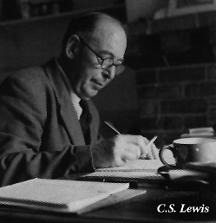
1. Turn off the radio [and television].
2. Read good books and avoid most magazines.
3. Write with the ear, not the eye. Make every sentence sound good.
4. Write only about things that interest you. If you have no interests, you won't ever be a writer.
5. Be clear. Remember that readers can't know your mind. Don't forget to tell them exactly what they need to know to understand you.
6. Save odds and ends of writing attempts, because you may be able to use them later.
7. You need a well-trained sense of word-rhythm, and the noise of a typewriter will interfere.
8. Know the meaning of every word you use.
Source: C. S. Lewis. Collected Letters. New York: Harcourt, Brace and World, 1966, 291-292. Quoted in Kathryn Lindskoog, Creative Writing for People Who Can't Not Write. Grand Rapids, Michigan: Zondervan Publishing House, 1989, 253.
By the way, I would only take issue with the second half of #7. C. S. Lewis was an advocate of writing manuscripts out by longhand before ever typing them on a typewriter. For those of you who even remember typewriters (!), Lewis isn't talking about the IBM Selectrics like I used in my 10th grade typing class in 1983. Rather he is referring to the old manual typewriters that moved a lever that struck the page when you pressed a key and thus created a rhythm of its own that would be distracting from the rhythm of the words you want to write as Lewis describes.
In my opinion, most modern computer keyboards are so quiet that it's acceptable to write in front of the screen. However, to her credit, Kathy still writes everything out by longhand first (on yellow legal pads) and then transcribes and edits on the computer.
Lewis was born on this day in 1898. Too bad we can't send him a birthday card. Do the next best thing and send Perry Bramlett, founder of C. S. Lewis for the Local Church an email wishing him a "Happy C. S. Lewis Day."
Holidays Back Home
It’s holidays back home,
Where time stands pretty darn still,
It’s holidays back home,
Where I go back to what is real.
When we get there Mom will say I’ve gained a little weight,
But, bless my soul she’ll pile her cooking high upon my plate.
Dad will ask the umpteenth time, “When ya’ll gonna have kids?”
By the time the sun goes down, he’ll be snoring behind closed lids.
On the roads you’ll surely see gun racks on every truck,
The daily news is filled with pics of “first-kill bucks.”
Screen doors slam and cowbells ring as day turns into dusk,
Mom hollers for some help with peas to shell and corn to husk.
Cotton bales are piled up high and catfish fill the ponds,
Our family spends the afternoon picking up pecans.
After supper we take a walk and slap mosquitoes from our arms,
We watch the lights go out down the road at the neighbors’ farms.
No matter where life takes me, no matter the heights I climb,
Back home is where I go when I need a quieter time.
It’s holidays back home
Where time stands pretty darn still,
It’s holidays back home
Where I go back to what is real.
© 2005, Kathy Mansfield
Quote for the Day #5

Source: my mother, who claims she was going for informational purposes. In honor of this profound statement, Kathy has written a poem:
I got lost on the way to the Alzheimer’s Home . . .
Despite a map, I started to roam.
I know there was a reason I was headed this way,
But, for the life of me, I just can’t say!
Four More Book Reviews Posted: 3 OT & 1 Methodology
These four reviews were written in August 1997 in preparation for the OT Historiographic Literature seminar I took at SBTS.
Alter, Robert. The Art of Biblical Narrative. New York: Basic Books, 1981.
Fischer, David Hackett. Historians' Fallacies: Toward a Logic of Historical Thought. New York: Harper & Row, 1970.
Long, V. Philips, "The Art of Biblical History." In Silva, Moisés, and V. Philips Long. Foundations of Contemporary Interpretation : Six Volumes in One. Grand Rapids, Mich: Zondervan Pub. House, 1996.
Sternberg, Meir. The Poetics of Biblical Narrative: Ideological Literature and the Drama of Reading. Bloomington: Indiana University Press, 1985.
The Day the Earth Stood Still: A Retro Review
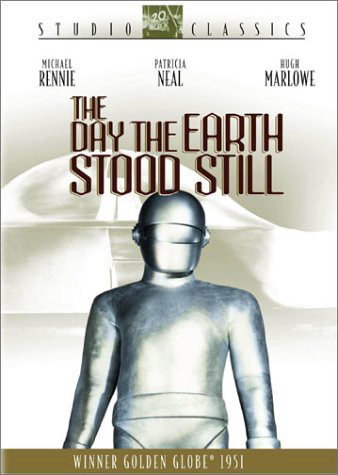
My brother-in-law, Clark Putman (Kathy's brother) gave me a copy of the classic 1951 sci-fi movie The Day the Earth Stood Still for my birthday this year. I saw this movie years ago as a kid, probably around the time when I was six or seven years old. Clark said it was one of his favorite movies of all time and figured I'd like it.
Well, he's right. It's a great movie--not perfect, but one that holds up pretty well over time, although it's definitely a symbol of the cold-war, flying saucer movies of the fifties. It would be impossible to name all the movies that are influenced by The Day the Earth Stood Still, but what comes to mind immediately are Independence Day, numerous Star Trek episodes and movies (especially ST:TMP and STIV), Battlestar Galactica, 2001: A Space Odyssey, The Iron Giant, and its fingerprints are even in films like Army of Darkness and Good Will Hunting. The producers chose to film most of their Washington DC scenes on location in the nation's capital rather than rely on Hollywood back lot sets--an innovation in its day, but done to add realism to the movie. To say that The Day the Earth Stood Still (from here on DESS) is a landmark film is almost understatement.
The film, directed by the recently deceased Robert Wise (The Sound of Music, Star Trek: The Motion Picture), begins with a flying saucer landing on the mall in Washington DC. Out of the saucer walks a very human looking alien, Klaatu (Michael Rennie) and a towering robot named Gort (Lock Martin). Klaatu comes in peace with a gift for the US President, but is predictably injured by a trigger-happy army soldier. Klaatu recovers and when he asks for an audience with all of the world's leaders, learns the reality of Cold War politics--the Russians won't come unless the meeting takes place in Moscow, and the Americans won't meet if the Russians are in the room. To understand the nature of earth's culture better, Klaatu escapes his army captors and assumes the role of a visitor to town, Mr. Carpenter. He soon finds a room at a boarding house where he meets a WWII widow Helen Benson and her young son, Bobby. Helen Benson is played by a young and quite striking Patricia Neal, years before she developed her trademark raspy voice, presumably from smoking. The actor playing Bobby is an extremely young Billy Gray, who would later go on to play "Bud" on Father Knows Best. Classic TV fans will also spot Francis Bavier, better known nine years later as Aunt Bea on the Andy Griffith Show, as one of the residents at the boarding house.

I'm going to break one of my review rules and tell you about part of the movie's ending, but it's core to my critique. And, hey, you've had 54 years to watch this movie, so if I'm spoiling anything for you, it's just as much your fault as mine. In shades of Star Trek: First Contact, the reason the aliens have decided to contact earth's powers is because earth has already developed atomic power for destructive use (the bombings of Hiroshima and Nagasaki) and has just begun experimenting with atomic powered rockets (according to the movie). Since earth's space exploration is inevitable, evidently there's some concern in the galactic community that earthlings will bring their violent ways to space. Space, we find out is a fairly peaceful place because years ago, the aliens submitted themselves to an inter-galactic police force represented by the giant robot, Gort. Earth is given a final ultimatum that they must either resolve their nations' violent differences and enter a new age of peace or face obliteration. Klaatu/Carpenter tells earth's leaders that he will await their answer and then the movie ends (see the quote at the beginning of the review). No doubt for 1951 audiences, the movie's ending was abrupt, and although not as surprising to today's audiences, may have been somewhat ahead of its time. There's no nice and neat resolution to this story. In effect, the decision for peace or destruction is handed over to the audience itself.

I have a couple of problems with this solution. First, giving that much power to any organization, even a representative organization like the UN, is a dangerous idea. The founders of our own nation's government knew this too well--that humans have an innate fallen disposition--which is why they created a system of checks and balances in our governmental system. Second, I realize the UN of the 1950's is quite different from the UN of today, but would we really want to answer to this organization which has been plagued by inefficiency and scandal in the last few years? Third, I have a bit of a problem with the way the decision is proposed at the end of the move. Yes, yes, I know it's a metaphor, but there's something disturbing about being "forced" into peaceful relations that bothers me. If we can't learn to live peacefully with one another from an internal change of heart, do we really want to fool ourselves into thinking we can be forced into it? I could just imagine the fictional earth of the movie choosing to submit themselves to the robot police force out of fear and then eventually plotting how to overthrow them. This is also why I don't favor christological interpretations of this movie that suggest Mr Carpenter (get it?) is a Christ figure who has come to persuade earth to pursue a better path. Long term peace cannot be forced. There must be a change of heart for peace to take place. Hate for one's neighbor has to fade away. That's a lesson the nations of the real earth still have to learn.
Regardless, this is a great movie that I absolutely recommend. The pace of DESS will seem much slower to modern movie audiences, but its real meaning is found in its dialogue rather than action sequences. The crisp black and white look of the film mixed with the story's content and genre gives it a Twilight Zone feel. The current DVD version has been produced from a restored copy of the film. Unfortunately, it's not widescreen. However, it does contain a number interviews with surviving actors and film crew, including Robert Wise before he died. Also included is an actual movie news reel from the era, that while selected because it refers to the movie itself, is more valuable for characterizing the international political landscape of the time in which the movie was made.
Klaatu Barada Nikto!
Questions? Thoughts? Comments? Rebuttals?

1. BE COURTEOUS.
If everyone will follow this simple rule, the other two will take care of themselves. You don't have to share my point of view. Debate can be fun. But politeness is a characteristic of civilized behavior. TRUE tolerance is the ability to disagree without going to war.
2. DON'T MAKE IT PERSONAL.
Name-calling and impolite labeling are unnecessary. Further, besides being discourteous, name-calling displays one's inability to adequately articulate a point of view.
3. KEEP IT CLEAN.
A wide variety of people read this blog--people of all ages. My MOM reads this blog! Please keep your comments rated G to PG.
Haloscan is set to alert me to any new comments, so I read them all. I value your opinions. Please respect these guidelines.
Thanks!
FPUforLife

Also, on his site, you'll find a really nice selection of family photos, original recordings, and worship videos that he arranged and directed. His site is really worth a look, and one that you'll probably spend a good bit of time exploring and coming back to on a regular basis.
"The Power of the Dog" by Rudyard Kipling
THE POWER OF THE DOG
by Rudyard Kipling
THERE is sorrow enough in the natural way
From men and women to fill our day;
And when we are certain of sorrow in store,
Why do we always arrange for more?
Brothers and Sisters, I bid you beware
Of giving your heart to a dog to tear.
Buy a pup and your money will buy
Love unflinching that cannot lie--
Perfect passion and worship fed
By a kick in the ribs or a pat on the head.
Nevertheless it is hardly fair
To risk your heart for a dog to tear.
When the fourteen years which Nature permits
Are closing in asthma, or tumour, or fits,
And the vet's unspoken prescription runs
To lethal chambers or loaded guns,
Then you will find--it’s your own affair--
But . . . you’ve given your heart to a dog to tear.
When the body that lived at your single will,
With its whimper of welcome, is stilled (how still!).
When the spirit that answered your every mood
Is gone--wherever it goes--for good,
You will discover how much you care,
And will give your heart to a dog to tear.
We've sorrow enough in the natural way,
When it comes to burying Christian clay.
Our loves are not given, but only lent,
At compound interest of cent per cent.
Though it is not always the case, I believe,
That the longer we’ve kept 'em, the more do we grieve.
For, when debts are payable, right or wrong,
A short-time loan is as bad as a long--
So why in--Heaven (before we are there)
Should we give our hearts to a dog to tear?
Perhaps the dilemma in Kipling's poem is best answered by Tennyson who said, "'Tis better to have loved and lost than never to have loved at all."
By the way, before any of you ask... Bessie, who is now seven, is doing fine as you can see below...

Responsible Spending for Black Friday

I'll admit that I'm on the email list for the Culture Jammers Network. What that means is that this time of year, I'm getting emails about "Buy Nothing Day" which to the rest of the country is known as "Black Friday," the largest spending day of the year. Last year, Americans spent $8 billion which was a 15% increase from the previous year. The problem is that over half of the purchases were spend on credit cards--primarily with money people didn't have.
I'm not choosing to join in with the Culture Jammers' suggestion to buy nothing on Friday (although I don't recommend looking for me in the malls). I don't think a spending ban would be good for our economy. However, spending money you don't have is not going to be good for the economy in the long term, and it won't be good for you at all. When people are so strapped from credit card bills, and their credit is shot, that's not good for them or the economy. And when people can't pay their bills and end up filing bankruptcy, that's certainly not good for the economy.
So, on Black Friday, be responsible. Be a good steward of what you have, and that begins by not spending what you don't have. Let "Black Friday" have new meaning by staying in the black yourself.
Related reading: "Black Friday Should Be Called Red Friday."
My First Experience with "iTunes TV"

So Thursday morning, with the smell of roasting turkey in the air, I checked a couple of times to see if Wednesday night's Lost episode "Collision" was available yet. It wasn't. I don't know exactly what time it was finally made available, but in the Central Time Zone, where we are this week, it did not show up in the iTunes Music Store until after noon, and after we were stuffed with a Thanksgiving meal.
It was easy enough to download. As soon as I clicked on the "Buy Episode" button, it was on its way to my PowerBook. However, I noticed it moving ever so slowly. Then, I remembered that I was the smart guy who had advised my mother-in-law to get the "cheaper" low-bandwidth DSL from BellSouth because I didn't figure she'd ever need anything as fast as my cable internet connection at home. The file for the episode is right at 195 MB. The DSL connection I had here only gets around 145 kbps, which is only a little bit better than the old ISDN connections. It took about two hours for the video to download. No problem; I needed a nap anyway. Too much tryptophan in my lunch...
This evening Kathy and I watched our downloaded episode of Lost. Here are my initial thoughts about the experience...
First, this kind of video-on-demand is the future. I don't know whether it will be done from a computer or a set-top box, or an integration of the two, but the day is soon coming where you'll think to yourself, "Hmm...I'd like to watch that episode of the Andy Griffith Show where Goober eats Aunt Bee's prize-winning apple pie," and you'll just download it to watch at will. Hopefully, it won't take two hours.
Second, the quality wasn't that bad. It's not high resolution, but at full screen on my 17" PowerBook, it was at least as good as my cable TV signal at home--although that's not saying much. Cable quality stinks these days. However, why wasn't it the widescreen version like the episodes from season one on the DVD set? Regardless, I'm going to assume that quality will improve as technology improves. We are in the early days of this kind of thing.
Third, there are huge advantages to watching television this way, because there are no commercials. I don't watch a whole lot of TV, but if I did, I would have to download it like this or tape it ahead of time because commercials are such a huge waste of time. But this works. Every time the screen went black for two seconds where the commercial would have been, I said to Kathy, "Commercial...look, NO commercial!"
And finally, my only REAL criticism is WHY THE HECK CAN'T I BURN THIS TO DVD? In spite of the fact that watching it was adequate on the PowerBook, I have no desire to watch an entire episode of anything on a computer. Yes, it was a novelty a few years ago when computers, especially laptops first had that ability. And I used to take DVDs on trips with me to play on my Powerbook, but when was the last time I did that? Can't remember. I really would rather watch a TV show on a TV! The inability to burn video that I have legally paid for to watch in the privacy of my own home is absolutely asinine. It's NOT illegal under any interpretation of copyright laws. If I can burn television shows I've recorded through other methods to DVD for my own personal, not-for-sale, not for public exhibition use, then it's legal for me to burn this to DVD and watch it on my television instead of my computer. If I can burn songs I've downloaded from the iTunes Music Store to CD, then what's the real difference with television shows?
Oh, I know, I know... you're supposed to download the show to your video iPod and then you can plug it into your television and watch it from there. For Job, Apple, and the movie and television industry, having a convenient, yet controlled avenue of video distribution was crucial as a justification for putting video capabilities on the iPod. But there's a much greater market out there for video on demand such as this than just for those with video iPods.
This is my only real complaint, but it is a BIG ONE. This isn't "FairPlay"; it's "Constrain-the-Customer-Because-We're-Paranoid-About-Piracy-Play." Has anyone hacked this yet? Whoever does gets my full support.
If you haven't checked out the video download abilities yet from the iTunes Music Store, overall, I recommend the experience if you don't mind limited selection and the inane limitation to only using your computer (or video iPod) for viewing. However, I am going to optimistically assume that both of these restrictions are temporary...
Job 42:11--from "evil" to "adversities"
In the original version it read,
Then all his brothers, and all his sisters, and all who had known him before, came to him, and they ate bread with him in his house; and the consoled him and comforted him for the all the evil that the LORD had brought on him. And each one gave him one piece of money, and a ring of gold.
I happened to note that in the 1995 update to the NASB, "evil" has been changed to "adversities" making the sentence "...they consoled him and comforted him for all the adversities that the LORD had brought on him" [emphasis added].
In the Hebrew, the word is ra'a meaning "evil, calamity, misfortune" (KB). The change in translation is legitimate and a reflection of the translators' theology. It's one thing to say that God caused Job misfortune; it's another thing to say he caused him evil.
However, ra'a can also be translated "chaos." Perhaps, in light of Job's misfortunes, this would be an accurate way to characterize his circumstances. Of course, some might argue that Yahweh is the God of shalom/peace, the very opposite of ra'a/chaos. Regardless, the verse says what it says in the original Hebrew.
Interestingly, the translators of the LXX (2nd cent. BC) avoided the issue altogether by not translating ra'a at all and making the passage essentially read, "...they comforted him and marveled at all the Lord had brought upon him... ."
As way of reference, here are how other translations handle ra'a in this verse:
"evil" = ESV, NRSV
"adversity" = HCSB
"trouble" = The Message, NET, NIV
"trials" = NLT
The Value of a Good Book Review

A book review is good for at least three things:
1. It alerts you to a book you did not know about previously.
2. It helps you decide whether or not you actually want to read a particular book.
3. It allows you to understand a book better.
In keeping with the third item, I am going to begin posting my old book reviews in a separate blog arranged by both the date created and searchable by category. I literally have dozens from the various book reviews I've done in classes over the years. The blogging module in RapidWeaver seems to be the perfect medium for making these available as I will post them under the original date they were written, but at the same time categorize them under a number of general headings.
A couple of weeks ago, a student in a class I was grading for at SBTS asked me what I thought was the best way to go about writing a book review. I told him what I was told by Ronald Deering over a decade ago--read other book reviews first. Reading a book review before beginning a new book--especially a more challenging book--is a good way to begin grasping content before you even read it. With that in mind, I'll let Google do its thing and hopefully some of these reviews will appear in various web searches when students, or anyone for that matter, looks for information on a book they need for a class or just for personal reading.
With each of these reviews that I post, I will include the name of the class for which they were originally written. I may at times, choose to cross-post a review written here for my main blog to the book review section as well.
At this time, I am not electing to include comments with these entries--it's not a normal blog after all, but if you feel a need to voice your thoughts about a particular review, please email me at rmansfield@mac.com.
The book reviews can be found as a submenu of Our Library (see link to the top left) or you can simply click here.
Initial reviews posted:
Blenkinsopp, Joseph. The Pentateuch: An Introduction to the First Five Books of the Bible. New York: Doubleday, 1992.
Dockery, David S., and David P Gushee. The Future of Christian Higher Education. Nashville: Broadman and Holman Publishers, 1999.
Fishbane, Michael A. Biblical Interpretation in Ancient Israel. New York: Oxford University Press, 1988.
Marsden, George M. The Soul of the American University: From Protestant Establishment to Established Unbelief. New York: Oxford University Press, 1996.
Noth, Martin. A History of Pentateuchal Traditions. Englewood Cliffs, NJ: Prentice-Hall, Inc, 1972.
Whybray, R. N. The Making of the Pentateuch : A Methodological Study. Sheffield, England: JSOT Press, 1994.
Happy Thanksgiving 2005
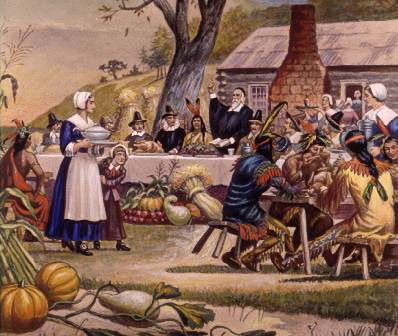
Slow to anger and abundant in lovingkindness and truth.
Psalm 86:15, NASB
What are you thankful for this year? Last year I asked what you were thankful for if you could only choose ONE thing. However, this year, I can't limit my thankfulness to one item. I have four that I'm naming, but I assure you there are many more. Here are my top four reasons to be thankful to our beneficent Creator:
1. I'm still most thankful that Kathy is my wife. Our little family of just the two of us and our little basset hound, Bessie Mae, is such a sanctuary of peace to me. Add to this that I'm thankful to be able to drive on a long trip to Louisiana with Kathy (we always enjoy the ride together) and spend the holiday with our family.
2. I'm thankful that I've been allowed to go back to school to finish my degree. I wouldn't recommend sitting out five years in the middle of such a pursuit like I did, but I'm extremely grateful for the opportunity to go back and finish.
3. I'm thankful for the opportunity to teach classes as an adjunct at Indiana Wesleyan University. I thoroughly enjoy working with college students.
4. Finally, I'm thankful that in the past year, we were able to combine the community where we live with the community with whom we worship. Thus, I'm thankful to be in a community of faith that is within walking distance from our home, Simpsonville Baptist Church.
Happy Thanksgiving to all of you.
"Contact Me" Page Not Working

The "Mother" of All Inclusive Versions
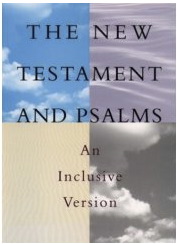
For those who haven't kept up with the debate, there are some within evangelical circles who want to make certain words in the Bible inclusive. That is, they want to take certain texts that apply to all people, male and female, and use non-masculine terms. Where the NIV read in Gen 1:26, "Then God said, 'Let us make man in our image... ,'" the TNIV reads "The God said, 'Let us make human beings in our image.'" Some object to the TNIV's translation because they want to hold to masculine forms that represent all of humanity. Another often cited example is Rev 3:20. In the NIV, it reads "Here I am! I stand at the door and knock. If anyone hears my voice and opens the door, I will come in and eat with him, and he with me." But notice the changes in the TNIV: "Here I am! I stand at the door and knock. If anyone hears my voice and opens the door, I will come in and eat with them, and they with me" [emphasis added]. I don't want to get involved with the debate at this time--I'll save that for a later blog. However, if the TNIV rendering of Rev 3:20 were written by one of my students on a paper I was grading, I would mark it as an error in agreement. "Anyone" is singular, while "them" and "they" are plural. But undoubtedly, the translators are among those who want to use "they" as an acceptable inclusive pronoun instead of the often more awkward used "he or she."
With all the attention the TNIV is getting, you'd think that it was the first inclusive version of the BIble released. However, that's not so. A number of translations are already inclusive such as The New Living Translation (NLT), The New Revised Standard Version (NRSV), and the Message. When the New International Readers Version (NIrV) was first released around 1996, it was inclusive; but when one of its major promoters, Focus on the Family, discovered this, they pressured the translators to change it. To my knowledge, the NIrV is the only translation I know of to be un-inclusive-ized (I think I've coined a word).
All of these inclusive versions agree in method that they only make references to humans inclusive, not references to God. The Creator is referred to as Father, and the pronoun "he" is maintained.
However, this was not the case with the release of the New Testament and Psalms: An Inclusive Version. I don't know of any standard abbreviation for this Bible, but from this point on I'll just use ILV, based on my correspondence below with one of the editors who referred to it as the Inclusive Language Version. In the ILV, even God was made gender-neutral. So, for instance, The Lord's Prayer in Matt 6:9ff begins,
Our Father-Mother in heaven,
hallowed be your name.
Your dominion come...
Not only is God referred to as "Father-Mother" instead of Father (the Greek is simply pater which is undeniably masculine in meaning as opposed to mater which would have meant "mother"), but the editors can't even use "kingdom" in the third line because "king" is masculine (as opposed to "queen") and therefore considered sexist.
The ILV was basically the NRSV text with any language that might be deemed sexist or offensive removed. Thus, it received the nickname, "The Politically Correct Bible."
Not only were gender-neutral titles used for God, but they were used even for the pre-existent Jesus and the post-crucifixion Jesus with the reasoning, "If God the 'Father' does not have a sex, then neither does the 'Son'" (p. xi). The traditional messianic designation "Son of Man" referring to Jesus is changed to "The Human One." Thus Mark 10:45 reads, "For the Human One came not to be served to but serve, and give up life as a ransom for many." Note the awkwardness of the last phrase because the editors did not want to use "his life."
Other changes include
- "Sovereign" or "Ruler" in place of "King" as a metaphor for God.
- Satan, angels, and demons are all represented gender-neutral (at least they were consistent).
- The metaphor of darkness for sin or a lack of the presence of the Gospel has been removed so as not to offend people with dark skin. So now, John 1:5 which traditionally reads: "And the light shines in the darkness and the darkness did not overcome it" is made to read "The light shines in the deepest night, and the night did not overcome it." I guess no one told them that it gets dark at night.
- In the genealogies, when known, wives' names have been added to their husbands. So, now where Matt 1:2 originally read "Abraham was the father of Isaac, and Isaac the father of Jacob, and Jacob the father of Judah and his brothers," it now reads "Abraham and Sarah were the parents of Isaac, and Isaac and Rebekah the parents of Jacob, and Jacob and Leah the parents of Judah and his brothers... ." Whoops, shouldn't the last phrase have included "and sister, Dinah"? And what about Jacob's other wife Rachel, and his wives two concubines? I mean, if we adding, let's add everybody!
-References to Jesus as "Master" in Luke's Gospel are deemed too harsh, so the less offensive "Teacher" is used.
- "Slaves" are now "enslaved people."
- Since John's Gospel is often criticized as being anti-semitic (in spite of the fact that the writer was almost undisputedly Jewish himself), references to "the Jews" become "the religious authorities" in the Fourth Gospel.
- No longer is Jesus the "Son of God," but now is the "Child of God."
- "Your right hand upholds me" in Ps 63:8 becomes "Your strong hand upholds me" lest any left-handed readers be offended by this oft-used biblical metaphor.
When the ILV was released in 1995, I was working at the Baptist Bookstore (now Lifeway) on the Southern Baptist Theological Seminary campus. This was only one of two BIble translations we were not allowed to carry (we could sell it if special ordered, but we couldn't carry it). Of course, I don't blame them at all for this decision. I would have done the same thing.
As many of you know, I have approximately 80 distinct English translations of the Bible in my possession for a hobby that goes back a couple of decades. Out of all these translations, I would really only count two as Bibles that I wouldn't use for devotional purposes under any circumstances. The ILV is one of them. Many translations carry with them a certain theological perspective. The Worrell New Testament reflects the Assembly of God background of its translator. I've heard that the God's Word translation carries a bit of a Lutheran flavor. Perhaps a case could be made that the Holman Christian Standard Bible reflects its Baptist heritage. But the ILV is an example of an editorial board's theology and ideology at a dangerous extreme. Here the culture (perhaps subculture considering the ILV's very limited audience who accepted it) was evidently more of a focus than the audience of the original text. Good translation does include bridging the gap between an ancient audience and a modern audience, but translators have to be careful not to create a a different document altogether.
Usually, when a New Testament and Psalms is released, there are often plans for an entire Bible to be translated. I wondered what had become of the ILV since 1995. I noted that on Amazon.com, it seemed to be out of print, and I could no longer find it in the Oxford Press catalog. The first name on the list of editors in the back flap was Victor Roland Gold who taught at Pacific Lutheran Seminary (though I believe he has now retired as he is no longer listed among their current faculty). I wrote to Professor Gold asking him about the status of the ILV. Here is the response I got back in an email:
Mr. Mansfield: thank you for your inquiry concerning the inclusive language Bible project supported by Oxford University Press. It was the plan to publish the entire Bible in the Inclusive Language Version. However, the response to the publication of the New Testament and Psalms, an Inclusive Language Version, was so negatively received in this country and especially in England, the "home" of Oxford University Press, that it was decided to suspend the project. Since then, there has been no indication of further work on the project, so I expect that that project has been effectively discontinued. Again, thank you very much for your inquiry, and your interest in the Inclusive Language Version Bible project --- Prof. Victor Roland Gold.
Deep down, I have to admit I'm pleased about this Bible's status--out of print, and dead. Of course, I would never be in favor of censoring any book or any translation, but I believe that in this case, the market bore out the value for this publication. As an offering to the church and general public, it was rejected. Therefore it is no longer in print and the project will not be continued. I also find Prof. Gold's comment interesting that the Bible was received even more negatively in England than in the US. I would have predicted the opposite would have been true.
It's one thing to have freedom in translation to try to creatively and accurately get across the message of the biblical texts, but it's another thing entirely to completely change the meaning of the texts.
I have to wonder if the editors of the ILV cringed at all when they translated the final chapter of Revelation? Here it is in their own words:
I warn everyone who hears the words of the prophecy of this book: if anyone adds to them, God will add to that person the plagues described in this book; if anyone takes away from the words of this book of prophecy, God will take away that person's share in the tree of life and in the holy city, which are described in this book. (Rev 22:18-19, ILV)
Lack of Faith in Walk the Line?
First is Terry Mattingly's "Walking the Line with God?" in which he says the movie totally misses the role Christianity played in the life of Johnny Cash and his family.
Second is a review by Mark Joseph, "A Faith-lite Johnny Cash" in which he calls Walk the Line "a beautiful movie with a gaping hole." He also contrasts this lack of insight from this movie's producers with Rick Rubin who produced Cash's "American" albums in the nineties, saying that this rock and roll producer, in spite of the fact that he didn't share Cash's faith, did understand the role it played in the life of the Man in Black and as such, that faith is reflected in these albums.
I don't disagree with the analysis of either of these writers. My expectations of Hollywood are just low enough that I'm not ever surprised that faith is downplayed in movies. Fortunately, Christian faith is a present theme in Walk the Line, even if it is not given the place it deserves.
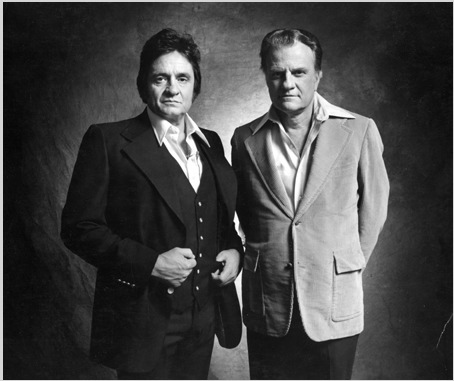
Above: Johnny Cash and Billy Graham, 1978, taken by Jim McGuire
Walk the Line

Johnny Cash: "Then they're not really Christians."
As far back as I can remember, Johnny Cash was a part of my personal culture. I don't remember a time in my life when I didn't know who he was. I still recall standing in a circle with classmates and my teacher when I was in kindergarten. She was letting us suggest songs and then we were singing them together. One little boy spoke up and said, "Oh, I know a song by Johnny Cash!" We all stared at him waiting. After a few seconds of racking his brain, he said, "It's something about a train."
In the last decade or so, I "rediscovered" Johnny Cash and have a number of his albums, including the famous "Live at Folsom Prison." Johnny Cash is like Billy Graham. Cash doesn't have a perfect voice, and Graham is not the most eloquent preacher you'll ever hear. Yet, both are extremely powerful when they use the abilities God gave them. Johnny Cash has the unique ability to connect to all kinds of people from all different walks of life. Whether listening to the live recording from Folsom Prison (1968) or his last album, "American IV: The Man Comes Around" (2002), Cash has the power to move you with his sometimes raspy, sometimes off-key voice. He sings about life. He sings about mistakes. He sings about faith and redemption.
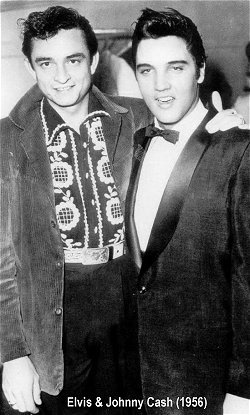
As I said, this movie is a redemption story, and as such, at times it was hard for me to watch. Why? Well, if the timeline in the movie is fairly accurate, Cash began to clean up his life in the late sixties. I was born in 1967, and I never had the image of Johnny Cash as the carouser who was arrested for drug possession. For me Johnny Cash has always been this great legendary performer who sang about real life and occasionally performed at Billy Graham crusades. In order for redemption to take place in the movie, we have to witness Cash's self-destructive downward spiral into alcohol and drug abuse, infidelity, and a failed marriage. The second act of Walk the Line is certainly not rip-roaring fun for the audience because most of us admired the man and feel a connection to him. Yet, it's significant that before he died, Cash was involved in this project from the beginning--down to his personal selection of Joaquin Phoenix to portray him in the movie. As unflattering as some of the events in his life were, I think that if he were alive today, Johnny Cash would approve of the final product. There were no skeletons in his closet because everything was out in the open. He was not perfect man, and he never attempted to portray himself that way. Perhaps that's why his music is so real and why we enjoy it so much.
As I mentioned, Joaquin Phoenix was personally selected for the role by Johnny Cash himself, reportedly after Cash saw Phoenix's performance in Gladiator. Although I don't know if I ever fully thought that I was seeing Johnny Cash instead of Phoenix in his portrayal, the latter is to be commended for his performance. Not only does he sing the Cash songs himself instead of relying on dubbed tracks, he even learned how to play guitar for this part. In fact, his best times of portrayal are when he performs. He has the Cash stare down, the tilt of the head back before launching into a song. He even holds his guitar in Cash's trademark style that looked more like he was firing a shotgun than playing a musical instrument.

Incidentally, I read a couple of weeks ago that Kathy Cash, Johnny's daughter from his marriage with his first wife, was displeased with the movie because she "said the film unfairly shows her mother, Vivian Liberto Distin, Johnny Cash's first wife, as a shrew." Granted, it's not my mother being being portrayed in the film, but Cash's first wife did not come across to me like that at all. If anything she is portrayed as a victim of Cash's earlier indiscretions.
With limited budget and my return to the life of a student, this was the first movie we'd seen in a few months, but one that I eagerly anticipated. My favorite parts were the performances, and I felt this was where Phoenix really shined. If you are considering seeing this movie with children, take the PG-13 rating seriously. Drug and alcohol abuse and marital infidelity are portrayed very realistically. And of course, like any movie portraying this era in American history, everyone smokes cigarettes.
But after you see Walk the Line, go listen to some authentic Johnny Cash recordings. Odds are, after seeing his real-life story, you will hear the words in his ballads in a different light and with new appreciation.
Mike Newell's Other Movies
I’m one of the only people I know that will go (or not go) see a movie because of who directed it or who wrote it. I’m not just talking about the new Steven Spielberg movie. I mean all movies. It is with that in mind that I’m very curious about Harry Potter and the Goblet of Fire.
Goblet is directed by Mike Newell, who is probably best known for Four Weddings and a Funeral and Donnie Brasco. Newell has also made a couple of films that are real gems, and they are worth seeking out: Enchanted April and Into the West.


Andrew can be contacted at arwell012002@yahoo.com.
Converting from iBlog to RapidWeaver
It's Official: No Right-to-Left Text in Mac Word 12
First, my source for this news is Rick Schaut himself (whom I respect very much), a software design engineer in Microsoft's Mac Business Unit (MacBU). On October 28, I emailed him asking if right-to-left (RTL from this point on) text was finally going to be available for Mac Word version 12, presumably to be released sometime in 2006. This was his reply:
At present, it doesn't look as though right-to-left text rendering will be in the next release of Mac Office. The reasons are somewhat complicated to explain, but they stem from differences between Windows and the Macintosh with respect to low-level APIs that provide context-based glyph substitution and the ability to get glyph-based (as opposed to character-based) measurements. At present, the only way we can do RTL in Mac Word would break the line-layout compatibility between Mac Word and Win Word.
I'm really ticked about this. In spite of the fact that Word for the Mac has been around longer, the Windows version of Word already has this ability in its current version. As much as I hate to admit it, I think I can honestly say for the first time WinWord has a leg up on MacWord. There I said it. Let lightning strike where it may.
For me this means that using Mac Word for writing a dissertation in the field of biblical studies is out of the question. I'll explain why in a minute. But it's not just folks in biblical academia who are left out in the cold. Anyone needing to compose text from right to left--whether it's modern Hebrew or even Arabic--can't use Mac Word. Nor can anyone use it who works with any Ancient Near Eastern language, most all of which are RTL. Word for Windows has had this ability since the release of Office 2003.
Let me give you a taste of the problem. First, of all, if you want to compose text in Hebrew, you can forget it because Hebrew is a RTL language and text that flows in this direction is not supported by Mac Word. Further, Unicode text pasted into a Word document does not display Hebrew correctly either. There are a number of advantages to using Unicode fonts. Read the Accordance Unicode page for more information or Joe Weak's Unicode introduction for biblical scholars. However, the greatest advantage to me is that Unicode fonts are generally cross platform. I should be able to give a document containing Greek or Hebrew text to a person using a Mac or Windows without worrying whether or not he or she has the same Greek and Hebrew fonts which has always been an issue in the past.
But I can't use Mac Word for any of this. The problem is that text that should look like this:
comes out looking like this when I paste it into MS Word 2004 for the Mac:

It's utterly unusable. Therefore, I've had to find an alternative, which is Mellel. Overall, I like Mellel, especially v. 2. But I really have sour grapes about being forced to switch software after using Word, first in Windows and then on the Mac, for the last fourteen years.
I'm not going to erase Word from my Mac. Granted, I've got thousands of Word documents that I've created over the years. Even though there is a Word import feature in Mellel, it's not always 100%, especially with the more complex documents. But what it does mean is that new documents get created in Mellel from now on.
The good news is that Mellel is extremely solid and built from the ground up to be a word processor for academic use. It's ability to handle unicode fonts, switch on the fly to RTL text direction, integration with bibliographic software like Bookends, extremely powerful outlining and styles features, and, of course, long document support make it a scholar's dream, regardless of the exact field. See the full feature list for yourself.
If you haven't tried Mellel yet, I encourage you to download the demo. Regardless of your requirements in a word processor, you may find that Mellel actually suits most of your needs best. Plus, the developers at RedleX, the makers of Mellel, are extremely accessible through their forums, and open to new feature suggestions. In fact, they ask for them. That's better than anything I've ever received from the other guys...
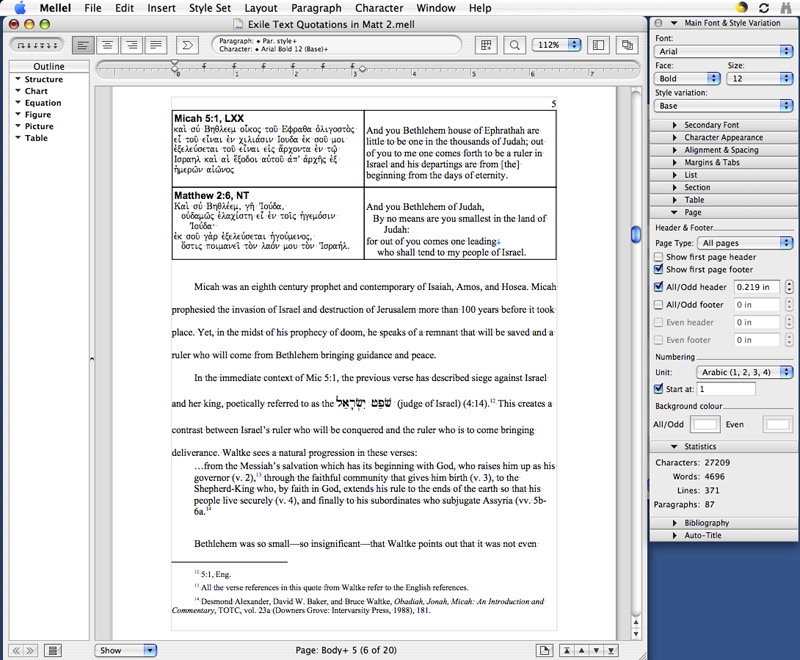
Above: Mellel 2.01 in all it's glory.
A Few Random Quotes from C. S. Lewis
The Four Loves
"Never, never pin your whole faith on any human being: not if he is the best and wisest in the whole world. There are lots of nice things you can do with sand; but do not try to build a house upon it."
Mere Christianity
"We may ignore, but we can nowhere evade, the presence of God. The world is crowded with Him. He walks everywhere incognito. And the incognito is not always hard to penetrate. The real labour is to remember, to attend, to come awake. Still more, to remain awake."
Letters to Malcom: Chiefly on Prayer
"It was not for societies or states, that Christ died, but for men."
The Weight of Glory, “Membership”
"God gives gifts where He finds the vessel empty enough to receive them."
Taliessin Through Logres, . . . Arthurian Torso, “Williams and the Arthuriad”
Quest for Peace: A Hero's Tale
The title, "Quest for Peace" is a takeoff from Superman IV: The Quest for Peace.
By the way, if you haven't taken a look at Comic Life yet, I highly recommend that you check out the fun things you can do to photos with it. There is also a user gallery on the Plasq site.
Quote for the Day #4
they are passionate about trivia.
Heard on today's Dennis Prager radio show in the context of the loss of soul in our culture.
Mellel 2.0 Released
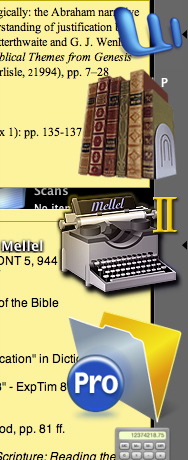
• Hyphenation
• Columns and section styles
• Improved RTF support
• Keep with next and Keep options (think widow and orphan controls on steroids)
• Space at top of page/column
• Table frames line type
• Document setup: Added inside/outside margins and background color
• Page style colour: Added colour options to page styles
• Navigating: Page up and Page Down keyboard navigation
• Dictionary access (Tiger only)
• View options: Several additions
• Find special codes: Some additions
• Moving tabs: You can now move the end margin beyond tabs.
• Restart Note options: Now with every page range or section too.
Visit the Mellel site to get the full list of improvements and new features.
There are actually quite a few more improvements than this, but these were the biggies. If you're not familiar with Mellel, you probably are thinking, "Big deal. Word's done all that for years." Yes, you're right, but what you don't know is what Mellel was already capable of including the best handling I've seen of unicode fonts on the Mac, and especially for me, Greek and Hebrew typefaces. Mellel's ability to use right to left languages such as Hebrew are far superior to most word processors, especially on the Mac platform. Further, Mellel integrates well with bibliographic/citation software such as Bookends or Sente which is crucial for academic writing.
With the more mainstream features added in the 2.0 release, Mellel is now set to be the best word processor on the Mac not just for academic writing but for any standard user. There is a bit of a learning curve for using Mellel because it was built from the ground up as a word processor that was not simply trying to be a less expensive alternative to Microsoft Word. Therefore, it doesn't do everything like MS Word does. Many of the "standard" word processing procedures have been rethought. However, the downloadable user manual is very straightforward, and the average user can be up and running in a short while.
Although I was part of the beta test for version 2.0, I wasn't able to contribute too much because it hit in the middle of my preparing for comps. But I've been using the beta for the past three weeks for everyday use and I found it to be incredibly stable. With the final release of the product, it should be even more solid now. For any of my fellow classmates at SBTS, I have also contributed a term paper template that adheres to the SBTS/Turabian style guide. It is available in the downloads section at the Mellel site.
Although the price for Mellel has gone up with version 2.0, it is still a bargain at $49.99 regular price and $34.99 academic price. Users of previous versions (such as myself) were able to upgrade for free.
I'm working on a post for later this week that gives more detail as to why I've dropped MS Word after 13 years and switched to Mellel for serious writing. Keep watching this space.
Quote for the Day #3
"Yeah...I'm learning people skills and that's definitely needed in life because people are everywhere."
This is true...
Don't Mess with the Man of God: 2 Kings 2:23-25
Okay, here's a passage that I bet you've never heard preached on, unless your pastor was desperately fearful of losing his position:

(2Kings 2:23-25, NASB)
I say I'm delivering this exposition seventeen years late because it goes back to my junior year in college at Louisiana Tech University. I was taking an adolescent literature class (my major was English Education) taught by a professor whom I liked quite well, Dr. J__ L___. You didn't expect me to call her by name did you?
One day in the midst of her lecture--and I don't remember how any of this related to the subject at hand--she announces that she grew up going to a Baptist church, but as she got older decided she didn't like the fact that Baptists tended to interpret the Bible so literally. She gave as an example the above passage and said she just couldn't read that passage literally; that is, she couldn't see God sending two bears to maul those poor little boys. Therefore, she proudly announced that as an adult, she had joined the Methodist Church because they often took such passages figuratively.
I heard her make this proclamation on one other occasion. During that same year, I was in charge of scheduling speakers for the daily chapel service at the Baptist Student Center. I had begun trying to regularly schedule some of the professors on campus who were also Christians. I encouraged them to tell about their journey of faith and how their beliefs made a difference in their vocation. Of course, I also asked Dr. L___, even though she had so proudly proclaimed why she was no longer Baptist. I guess I should have expected it, but she proclaimed again why she was no longer a Baptist (hey, this time AT the Baptist Student Center--thank you very much), because she preferred to interpret such passages as 2 Kings 2:23-25 figuratively and the Methodists evidently let her do this.
Now, don't get me wrong. I really liked Dr. L___. She was a great teacher. If anything, it's my fault for not addressing this subject with her, and pressing her a little bit further.
I would want to ask her a couple of questions. First, since 2 Kings is historiographic literature, where exactly are the textual markers to indicate that we're moving from what is being written as history to something like a parable? See, in 2 Samuel 12 when the prophet Nathan comes to confront David over his sin with Bathsheba, he tells a story that begins in a common parabolic introduction by using unnamed characters, "There were two men in one city, the one rich and the other poor... ." Things like these are textual markers that indicates when a narrative is transitioning between something literal and something figurative.
By the way, a good Baptist (or any denominational affiliate) Bible reader does not interpret everything literal in the Bible, but makes the judgement based upon the type of literature being read and whether or not symbolic language is being used. As it has often been pointed out, when Jesus says, "I am the door" in John 10:9, the reader should not take that literally and start thinking of Jesus as a flat piece of square wood with a knob! The reader should know that symbolic language is being used and that language should influence interpretation. Poetic books such as the Psalms also used symbolic language that was not meant to be interpreted literally. Jesus often used hyperbole, or exaggeration to get his point across. The reader must let the text dictate how one reads and interprets Scripture.
Having said all that, I realize that there are those who do not believe that the stories of Elisha and Elijah are historical, but they hold them to be myth. Although I would disagree with that position, that is beyond the bounds of our subject at hand and would have to be addressed elsewhere. But for Dr. L___, even though I haven't asked her, I could almost guarantee that she believes that there is at least some actual history in the stories of 1 & 2 Kings. Rather, I think she had difficulty with a very unusual passage and opted just to reject its literalism. But as I have suggested here, the literature itself does not contain any clue that the writer is not presenting what he believes to be actual events.
Secondly, I don't think that Dr. L___'s alternative really helps her. What I want to ask her is, "Dr. L___, if you don't take this passage literally, then what the heck is it supposed to mean if taken figuratively? Although I never asked her, I really don't know if she ever got around to interpreting the passage with her new method. It's a difficult passage no matter what. I would speculate that it was enough for her to say, "Well, I'm not going to take that literally" and just go on.
But what does the passage mean? My former teacher is not the first to dismiss this passage as unbearable (pun intended) and write it off as irrelevant and unhistorical. One commentator, J. Gray, has said that this passage is "in every aspect a puerile [childishly silly or trivial] tale... There is no serious point in the incident, and it does not reflect much to the credit of the prophet... at best the memory of some catastrophe which happened to coincide with Elisha's visit to Bethel."
I agree that the passage is difficult, and I admit that because of its brevity, there is a temptation to simply move past it. However, I believe that would be a mistake. If for nothing else, from strictly a literary aspect, the biblical writers did not waste valuable scroll space on irrelevant and unnecessary information. Everything that you find in the biblical record, even if it at first glance seems of little importance or uninteresting, serves some purpose in the overall account.
As for such distaste for this passage, we should probably first read it as undoubtedly Dr. L___ would have read this when she was young--out of the King James Version. There is a crucial mistranslation in the Authorized Version that presents to the reader these words, "And he went up thence unto Bethel: and as he was going up by the way, there came forth little children out of the city, and mocked him... ." Generations have read this story and thought, "Why that cruel prophet, Elisha, sending out those bears to kills those poor little children!"
But "little children" is a tragic mistranslation of the Hebrew word, ne'arim or in the singular, na'ar. For the record, like the NASB quoted above, "young lads" is also used by the ASV. The NIV uses "youths"; the Message has "little kids"; the NLT, TNIV and CEV have "boys"; and the ESV, NRSV, and HCSB uses "small boys." No doubt people come to this passage and wonder why God would allow bears to maul these poor little, mischievous boys?
But is a boy, let alone a small boy a good translation of na'ar? Well, it is possible, but that's not the only way this word is used. According to the Koehler/Baumgartner Hebrew lexicon, na'ar can be defined as "a male who is available for marriage and not yet betrothed." How old were these "boys" in 2 Kings 2? I would suggest they were teenagers. Further, to use modern terminology, these were punks.
But before I get back to the punks taunting Elisha, let me first demonstrate that na'ar is used for more than just "little boys" in the Old Testament. The word occurs over 230 times, and although sometimes it does refer to young boys and even infants (1 Sam 1:22; 2 Sam 12:16), it can also be used for young men, perhaps what we would think of as teenagers and even older.The following few examples should demonstrate its variety of usage.
Gen 19:4 - the younger men who surrounded Lot's house along with older men so that they might abuse his angelic visitors. Definitely not little boys!
Gen 22:3 - the two young men who accompanied Abraham when he was commanded to sacrifice Isaac.
Gen 34:19 - Shechem a Hivite who raped Jacob's daughter Dinah in Gen 34:2 is described as na'ar," young man" in this verse.
Gen 41:12 - Joseph is described with this word at the time when he is in prison.
Ex 33:11 - Joshua, who is already in service to Moses is described as na'ar. He is clearly not a child in this passage, but perhaps in his late teens or twenties.
Josh 6:23 - The two spies who were sent into Jericho and later rescued the harlot, Rahab, and her family are described as "young men" (na'ar), but these are definitely not children.
1 Sam 17:33 - David is described as a na'ar in this verse, in spite of the earlier description in 1 Sam 16:18 as a "mighty man of valor, a warrior...and a handsome man [ish]."
1 Sam 21:4 - When David and his "young men" are on the run from Saul, Ahimelech the priest is willing to give them consecreted bread to eat on the condition that the young men (ne'arim) have "kept themselves from women." I think we can safely assume these are not young boys. In fact David's band of young men in these stories are generally always referred to with our same word in question.
2 Sam 18:5 - Absalom, who is obviously not a boy by this point in the narrative as he has already led a rebellion against his father, King David, is here referred to as na'ar by David himself.
And there are more examples, but I think this demonstrates the point that na'ar has a wide variety of uses that fits within the definition of "a male who is available for marriage and not yet betrothed." Context has to determine whether na'ar is referring to infants, children, adolescents, or young adults. Clearly, the context of 2 Kings 2:23-25 dictates that "young boys," "children," etc. is mistranslation. Let me tell you why.
First, the taunt itself. "Go up, you baldhead" in the NASB is pretty literal. What does it mean? Well, obviously, these hoodlums were, at the very least, mocking the appearance of Elisha. In some cultures of the Ancient Near East, baldness was considered a sign of a lack of integrity. But such prejudice is not bound by culture or time (and I say this with a full head of hair!). I remember seeing an altercation at a movie theater a few years ago when a manager was trying to evict a teenager, probably not too much unlike those that Elisha encountered. Rather than respond with any amount of reasonableness, the young punk continually screamed at the manager referring to him as "You BALD _________ __________. I remember thinking at the time that the manager's lack of hair really had no bearing on the incident at hand.
I've often wondered if "go up" is some kind of Hebrew idiom that has become lost in translation to us over time. Some of the newer translations have tried to smooth out the meaning. The NLT has "Go away, you baldhead!" and the TNIV reads "Get out of here baldy!" In the Message, Eugene Peterson paraphrases, "What's up old baldhead! Our of our way, skinhead!" However, Paul House has speculated that "go up" may refer to the manner of the departure of Elisha's mentor, Elijah, in which he was carried off to heaven in a chariot of fire. This event had just taken place earlier in the chapter. Thus, he was being told to go away just like Elijah.
In response to the taunts, Elisha "curses" them in the name of Yahweh. According to House, the Hebrew word for "curse," qalal, "means 'punishment' or 'consequence' in the [Old Testament], not 'foul language' or 'magical incantation' as it often does in current common English usage." Immediately--and this is the part that makes people so uncomfortable--two bears (we're told they were female bears) came out of the woods and mauled 42 of the young men.
That last piece of information, to me, is the crucial clue that we're not dealing with little children. If 42 were mauled, there may very well have been more involved in the incident. Regardless, we're dealing with a mob situation. Elisha, God's prophet, is being harassed by a large gang of unruly punks. From a modern perspective, think of the people in France who have been rioting for two weeks straight. Had something dramatic not happened when it did, Elisha's very life might have been at risk. Yes, from a certain perspective it's certainly tragic that 42 young men had to lose their lives, but we need to be careful not to misplace sympathy for the instigators in this situation instead of for the victim--Elisha.
The discomfort this story brings to the modern reader equates it with the story of Achan in Josh 7 and Ananias and Sapphira in Acts 5. In all three of these circumstances, judgement came fairly swiftly and was final in that the antagonizers all lost their lives. But what all three of these incidents have in common is that they were turning points in the history of the people of God. A strong example had to be set as a warning to current and future generations that such behavior would not be tolerated. Any good school teacher knows this principle--that one must be severely strict at the beginning of a school year, and perhaps even make an example out of one or two students to prevent further trespasses from taking place.
For Elisha, he had just become successor to Elijah's ministry as prophet to the one true God. Both had served a nation that for the most part was hostile to them. The gang of young punks who antagonized Elisha had intentions for him that were not good. They did not respect him, but ultimately, their rebellion was against God. Therefore a dramatic example had to be made that demonstrated that this man operated under the power and the authority of the Creator God. My feeling is that from this point forward, Elisha never had this kind of trouble again. People would have stayed out of his way.
Now whether a person takes this story as literal history (as I do) or as a symbolic parable, the point is still pretty much the same. To oppose the person God has assigned to a task is essentially the same as opposing God himself. Therefore, the safest thing to do is don't mess with the man of God.
Sources referenced:
House, Paul R. 1, 2 Kings. New American Commentary, vol. 8. Nashville: Broadman & Holman Publishers, 2003.
Koehler, Ludwig et al. The Hebrew and Aramaic Lexicon of the Old Testament. Leiden: Brill Academic Publishers, 2002.
Wiseman, Donald J. 1 & 2 Kings: An Introduction and Commentary. Tyndale Old Testament Commentaries, vol. 9. Downers Grove: Intervarsity Press, 1993. [The quote from Gray came from this source].
A Look Back at the Matrix Trilogy
Return again with me, if you will, to the heady days of 1999, as a sci-fi movie was shaking the world. No, I’m not talking about Star Wars Episode One. I meant The Matrix.
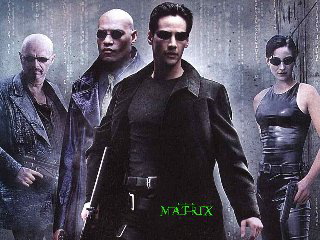
Lots of money was made. Sequels were demanded. And that is where things begin to go askew, and where my autopsy begins.
The Matrix Reloaded and The Matrix Revolutions (abbreviated as Re and Rev from this point on) fall into that rarest of all movie categories: movies that are ambitious, reach for the stars, and fail. I wanted both these movies to succeed, to be great; but when I finally viewed them, no matter how cool the action scenes were, no matter how much great intellectual discussion they threw at me, I knew the movies were flawed, and being the passionate movie person that I am, it tore my heart out. I mean, I’m still thinking about it, and it’s been two years. And judging by Internet chatter, I’m not the only one. The box office speaks too: Re made over $250 million at the theaters; Rev barely made $125 million. Somewhere along the way, people got burned.
What went wrong? I offer up three reasons:
When it gets down to it, they are still movies. The original Matrix successfully appealed to a mainstream audience while maintaining a fan base. Even with all the intellectual discussion, plot and character were never sacrificed. Movie-wise, everything clicked, like the tumblers in a safe. After several viewings, I believe that Re (especially) and Rev (less so) succeed in expanding on the ideas and principles introduced in Matrix. There is a lot to sift through and understand; the material is denser; and, unfortunately, it is not always presented or demonstrated clearly. Nevertheless, it satisfies the fan base.
But the mainstream audience is coming to see a great movie, with a strong plot and good characters. And that is where Re and Rev stumble. There are many problems, so let’s look at a noticeable one: the character of Morpheus.

Misjudging what an audience will do. For the sequels, the Wachowski Brothers (the directors) decided to tell their story through several different sources. A series of short cartoons (shown in theaters and online, and then collected on DVD as The Animatrix) were created, with some providing important plot information for the sequels. A video game was also developed, again providing plot information.
For the fan base, that’s more Matrix to enjoy. But for audiences who neither watch cartoons nor play video games it’s a real liability. Without the knowledge learned from other sources, the movies can be hard to follow. For example, who is the (very annoying) kid following Neo around Zion? If you don’t see one of the cartoons, you’ll never know. The movies should have been able to stand on their own.
Finally, the creative control went to the director’s heads. This is pure speculation on my part. Generally, it is the dream of every movie director to have creative control of a project—to not have suggestions made by editors or producers or test audiences. Indeed, I believe movies made by committee are usually the worse for it; but sometimes it is helpful (Casablanca is an outstanding example). Being fairly new in Hollywood at the time, I seriously doubt the Wachowskis had the clout to get creative control for Matrix—too much money (at least $60 million, probably more) was involved. With Re and Rev the Wachowskis had the clout to get complete creative control. With complete control, however, you can wind up in a vacuum, not able to get any feedback or advice from outside your viewpoint. The danger then becomes that when you show your movie to the audience, they might not understand what you were trying to do. I think that is what happened here.
So there you have it—what went wrong and maybe why. No doubt, there will probably be disagreement with my theories. That’s encouraged. As for me, anytime I catch one of the Matrix movies, some part of me will be sad about what could have been.
You can contact Andrew Wells at arwell012002@yahoo.com
Welcome to the New Site
Feel free to explore around. Anything that was available before, should still be here. Note that older blog entries are archived. You can search for them by hitting the subject link or the date link in the column on the left. I've done my best to try to make sure that links are working, but if you find something specific that is broken, let me know.
You can get here simply by pointing your browser to http://thislamp.com. The old blogs are still mirrored where they were to begin with for the sake of certain permalinks that pointed to them elsewhere on the net. But new entries will be added here from now on, not there.
Unfortunately, in copying the blog entries to the new software, I was not able to retain the old comments. However, I am still using my same Haloscan account, so therefore, the old comments are still contained in the Comments Feed. By the way, if you are tracking this blog by RSS, you will also need to take note of the new feed for this site.
By the way, the new site is completely done with RapidWeaver, which I highly recommend. Over the past few years, I've created sites in a number of applications, including PageMill, FrontPage, GoLive, and DreamWeaver. For the past two or three years, I had been using Apple's .Mac Homepage templates for my website and iBlog for my blogs. But I had to link these two to each other. Further, although I had been using the .Mac Homepage templates for ease of use, I was frustrated over lack of control. RapidWeaver creates the perfect balance. I have to do very little HTML coding, and the site has a consistent, professional look. RapidWeaver is not perfect yet, and I have already left a number of suggestions in their forums. But I believe that it is just about the best tool I've ever seen for what it does.
Please give me your feedback, and enjoy the site.
One Thing I Love About Computers...
The Most Powerful Way to Transform Culture?
(Matthew 5:14, The Message)
Philip Yancy has written an extremely reflective column, "Exploring a Parallel Universe: Why does the word, evangelical threaten so many people in our culture?"
I'm still processing the message of Yancy's column, but it strikes a chord that I've pondered many times in my mind. How do we best reach a pagan culture? Where is the line between maintaining a moral voice in the culture and legislating morality? Yes, some morality will always be legislated (it will always be illegal to steal), but at what point do we start placing Christian values on non-Christians? Are we best served by loudly proclaiming moral positions or focusing on reaching individuals one at a time with the transforming message of Jesus Christ? If we are called to do both, to which do we devote more energy? How do we best fulfill Matthew 5:14?
The ancient Jews enforced their customs and moral particulars on themselves and those who had converted to Judaism. But to the remaining gentiles of the world, they only held them accountable to the so-called "Noachian commandments" which were prohibitions against idolatry, sexual immorality, and bloodshed. Are we sometimes guilty of expecting non-Christians to act like believers? Are our evangelistic efforts bringing non-Christians closer to faith, or are we pushing them away? I don't have any easy answers, but feel free to offer your thoughts.
I would encourage you to read all of Yancy's article, but I would like to close with his last two paragraphs:
...I remembered a remark by [C. S.] Lewis, who drew a distinction between communicating with a society that hears the gospel for the first time and one that has embraced and then largely rejected it. A person must court a virgin differently than a divorcée, said Lewis. One welcomes the charming words; the other needs a demonstration of love to overcome inbuilt skepticism.
I thought, too, how tempting it can be—and how distracting from our primary mission—to devote so many efforts to rehabilitating society at large, especially when these efforts demonize the opposition. (After all, neither Jesus nor Paul showed much concern about cleaning up the degenerate Roman Empire.) As history has proven, especially in times when church and state closely mingle, it is possible for the church to gain a nation and in the process lose the kingdom
The Miserable State of Tech Publishing

My first computer was a TRS-80 Color Computer in 1982. I've always been an avid reader (as some of you know), and as long as I've used computers, I've subscribed to and read a wide variety of computer magazines over the years. In the eighties, even as a teenager, I had subscriptions to magazines such as Personal Computing and Family Computing, neither of which are still in publication. Later, I subscribed to PC Magazine, PC World and PC/Computing (the latter of which is no longer in print). When I switched to the Macintosh platform in 1998, I subscribed to MacWorld and MacToday. I still get both, but MacToday transformed into MacDesign and now Layers. When my subscription to Layers expires next year I won't be renewing since it has lost its primary Mac focus. The Adobe-colored substance on Scott Kelby's nose doesn't impress me.
A lot of the tech magazines, across all platforms, have not adjusted well to the internet. With tech websites updating their information hourly, it's impossible for tech magazines to deliver anything like news in the truest sense of what the word means. And unfortunately, the publishers haven't figured out how to adapt. I still have a handful of the old Personal Computing magazines from a couple of decades ago. The difference between the depth of the stories back then and what exists now is amazing. Current magazines focus on short articles that often feel more like advertisements than real tech journalism. Tech magazines today could adapt by focusing on in-depth analysis and comparisons, interviews with industry figures and innovators, commentary, and help and tips columns (the latter of which is the only real value to me in a magazine like MacWorld). These kinds of foci are not overly dependent upon "breaking news" which has dominated tech publishing for so long.
Last Wednesday, Chris Howard wrote a piece called "Is the Web Killing the Computer Magazine?" As a follow-up the next day, Charles Moore responded with "Are Computer Magazines Going the Way of the Dodo?" I responded to Mr. Moore's article and he published my thoughts and those of others on Friday.
For those of you who may have missed that, I have reproduced my email below (slightly touched-up from the original).
Re: Are Computer Magazines Going the Way of the Dodo?
From Rick Mansfield
Your column got me going. I posted in the comments (twice!), but I wanted to make sure you saw it, so I'm pasting it below:
I agree that Mac magazines (and any computer magazine for that matter) is at a disadvantage because they really can't do "news" anymore. By the time it's in print, it’s no longer NEWs.
However, that doesn’t mean that computer magazines couldn’t adapt. What could they offer? They could offer exclusive opinion and in-depth analysis that’s not available on the web, at least not for a certain period of time. A long (i.e. in-depth) article reads better in my arm chair than on my computer screen for me.
But what's happened to Mac magazines? Take MacWorld for instance. Compared to the issues published ten or fifteen years ago, it's anemic. I know that advertising can play a role, but the articles themselves have been dumbed down. They don’t have the depth that they did years ago; there's not near as much detail in their analysis.
And regarding MacWorld, what happend to the columns? There’s no more David Pogue, no more Andy Ihnatko. Dig through your stacks and find an old issue of MacUser. They had great columns that weren’t afraid to say negative things about Apple or the computer industry when deserved. When was the last time you read anything negative about Apple in MacWorld? Conflict of interest--Apple advertises in MacWorld.
Remember when Dvorak used to write a column for MacUser? How mad everyone would get at him? When was the last time an article in MacWorld Magazine stirred your passions? And speaking of which, if MacWorld was supposed to "incorporate" MacUser as the covers said a few years ago, whatever happened to that?
And how come the Brits still have MacUser and we don't? Is the American market smaller than the British market for a Mac magazine? I doubt it. And how come the British MacWorld magazine is TWICE the size of the American edition? And why do they have different (and often better) articles?
Oh, I think there’s still a place for a Mac or tech magazine, but unfortunately, there's no vision among American publishers.
And one more thing now that I’m ranting on MacWorld… why do they feel like they have to mislead their readers when it comes time to re-subscribe?
The standard price for a MacWorld subscription is $19.95. If you are a subscriber, about six months into your subscription, they send you a renewal notice with a bill for $34.95! I guess they think you won’t be paying attention or you won’t remember how much you paid last time and you’ll just write a check and send it in. I’ve both emailed and called about this practice which I think is dishonest and manipulative. I've yet to get a satisfactory explanation. They just always offer to renew for $19.95. I can’t get it across to them that their giving me a lower (original price) offer is NOT the point.
I was so ticked that when my subscription was about to run out a few months ago, I decided not to re-subscribe--even at the $19.95 price. I figured if I saw an issue on the stands that I felt I really needed, I'd buy it then. Heck, they put their best stuff on line anyway.
So at the final week before my subscription was about to run out, would you believe they sent me a "professional discount offer" for $12.95?
At that price, I took it.
Seventy-Nine Versions of the Bible

One of the first things I wanted to do once my comps were through was to inventory my collection of Bible versions in English. I've been collecting Bible translations and paraphrases for twenty years--since I was a teenager. Currently, I seem to have seventy-nine distinct versions of the Bible or parts of the Bible.
I've always enjoyed comparing translations ever since that day in Sunday School when I was a child and none of us could make any sense of Romans 7:14-21, even our teacher. Most of us had King James Versions because my church gave KJV Bibles to us with our names printed on them when we were in the third grade. Even our teacher had trouble understanding the passage. Then, I went home and read the same passage in my copy of the Children's Living Bible (which was just an edition of the Living Bible with a number of pictures), and it all clicked. That was my introduction to the value of comparing translations during Bible study.
Even after taking multiple Greek classes in seminary, I find reading English translations to be very rewarding.
Feel free to look around at my list. I am cross posting it on the other side of my website , where I hope to eventually start annotating this list with descriptions regarding the distinctives of each translations. If you happen to notice any available versions I don't have, please let me know. I have listed my collection in chronological order, which is also how they are organized on my shelf at home.
Before you ask...no I have not read them all. But I'm working on it! I try read the Bible daily, and when I finish one translation, I go on to another one.
1388 - The Wycliffe New Testament (Modern Spelling edition)
1530-1537 - Tyndale’s Old Testament (Modern spelling edition edited by David Daniell)
1534 - Tyndale's New Testament (Modern spelling edition edited by David Daniell)
1602 - The Geneva Bible Annotated New Testament (facsimile edition)
1611 - King James Version (facsimile edition)
1769 - King James Version (Standard 4th edition in use today)
1833 - The Webster Bible
1862 - Young's Literal Translation of the Holy Bible
1885 - Revised Version
1885 - Spurrell’s Old Testament Translated from the Original Hebrew
1899 - Douay - Rheims Version (Roman Catholic/Revised from 1609 edition)
1901 - American Standard Version
1902 - Rotherham Emphasized Bible: A Literal Translation (Joseph Bryant Rotherham)
1904 - The Worrell New Testament
1909 - Weymouth New Testament in Modern Speech
1924 - The New Testament in Modern English (Centenary Translation / Helen Barrett Montgomery)
1927 - An American Translation (Smith/Goodspeed)
1935 - The James Moffatt Translation
1937 - The New Testament in the Language of the People (Williams NT / Charles Bray Williams)
1944 - The New Testament of Our Lord and Savior Jesus Christ: A New Translation (R. A. Knox)
1946 - Revised Standard Version (New Testament)
1949 - The Bible in Basic English
1952 - The New Testament: A New Translation in Plain English (Charles Kingsley Williams)
1957 - The Holy Bible from the Ancient Eastern Text (George M. Lamsa)
1961 - The New Testament: An Expanded Translation (Kenneth A. Wuest)
1965 - The Amplified Bible
1968 - The Jerusalem Bible
1968-1970 - The Cotton Patch Version of Paul’s Epistles, The Cotton Patch Version of Luke and Acts, The Cotton Patch Version of Hebrews and the General Epistles, The Cotton Patch Version of Matthew and John
1969 - The Modern Language Bible (The New Berkeley Version in Modern English)
1970 - King James II Version
1970 - New English Bible
1971 - The Living Bible
1971 - New American Standard Bible
1971 - Revised Standard Version (second edition)
1972 - The New Testament in Modern English (Phillips’ Revised Edition)
1974 - The “Word” Made Fresh: A Unique Version of the Bible, Volumes 1 & 2 (Andrew Edington)
1976 - The Holy Bible in the Language of Today: An American Translation (William F. Beck)
1976 - Today’s English Version (Good News Bible)
1978 - New International Version
1981 - The Compact Bible: The New Testament in Fewer Words (New Testament)
1982 - The New King James Version
1983 - The Simple English Bible New Testament (Parallel w/ KJV)
1984 - New World Translation of the Holy Scriptures (Revised Edition)
1985 - The Holy Gospel of John (Peter Levi)
1985 - New Jerusalem Bible
1985 - Tanakh: A New Translation of the Holy Scriptures According to the Traditional Hebrew Text
1986 - New American Bible (Revised from 1970 edition)
1986 - New Life Version
1987 - English Version for the Deaf (AKA Easy - to - Read Version
1987 - New Century Version
1988 - Christian Community Bible (Catholic Pastoral Edition)
1989 - God's New Covenant (Heinz Cassirer's New Testament)
1989 - Revised English Bible
1990 - New Revised Standard Version
1990 - The New Translation: The Letters of the New Testament
1991 - The Unvarnished New Testament (Andy Gaus)
1992 - The Alba House Gospels (Mark A. Wauck)
1992 - Good News Translation (Good News Bible/Today’s English Version – Second Edition)
1994 - The Golfer’s Good News: A Golfer’s Translation of the Gospel of Matthew (Alan G. Meadows)
1994 - The 21st Century King James Version
1995 - Contemporary English Version
1995 - God’s Word
1995 - New American Standard Bible: Updated Edition
1995 - The New Testament and Psalms: An Inclusive Version
1995 - The Schocken Bible: Volume I: The Five Books of Moses
1996 - New International Readers Version
1996 - New International Version, Inclusive Language Edition
1996 - New Living Translation
1998 - The Complete Jewish Bible (David H. Stern)
1999 - New International Readers Version (Second Edition—inclusive language removed)
2000 - King James 2000 Version (Robert A. Couric)
2001 - The Holy Bible, English Standard Version
2002 - The Message: The Bible in Contemporary Language (Eugene Peterson)
2003 - The English Majority Text Version of the Holy Bible (Revised Edition / Paul W. Esposito)
2003 - New English Translation (The Net Bible / Second Beta Edition)
2004 - The Holman Christian Standard Bible
2004 - The Word on the Street (Rob Lacey)
2005 - Today’s New International Version
Registered: THISLAMP.COM

Adjust your bookmarks...
Over the weekend, I registered the domain name THISLAMP.COM which will now take you directly to this blog. I am phasing out the use of ricksblog.net .
What's the story behind the name? Well, two years ago when I started this blog, I was curious as to what I would cover. So I brainstormed a list that consisted basically of things I was interested in: religion, technology, movies, books, and politics. I thought to myself that this seemed like a long list, and without thinking too much about it, I added the words, "and this lamp, and that's all I need." Of course that's a line from the Steve Martin movie, The Jerk , but hardly anyone has ever gotten this reference.
When I first started the blog, I simply called it "Rick's Blog." I even registered ricksblog.net. However, every Rick and his brother has a blog called Rick's Blog. So eventually, I shifted "This Lamp (and that's all I need...) to the beginning of the banner rather than at the end, and started calling the blog "This Lamp."
That's where we are, and I plan to leave it like that. Ricksblog.net will remain active for the next year or so (although I'm going to direct it to a transitionary page), but then I will auction it off on eBay or somewhere. Somebody ought to have use for ricksblog.net, don't you think? It's a pretty catchy domain name, I think.
"This Lamp" was originally just a catchy tagline, but now it's the title. I'd like to think that's it now carries more meaning than merely a line from a movie.
Jesus said, "None of you lights a lamp and puts it in a place where it will be hidden, or under a bowl. Instead you put it on its stand, so that those who come in may see the light" (Luke 11:33, TNIV). Perhaps this blog can be a lamp now and then to folks who find themselves in the dark.
Politics Test
| You are a Social Moderate (56% permissive) and an... Economic Moderate (55% permissive) You are best described as a:
Link: The Politics Test on Ok Cupid Also: The OkCupid Dating Persona Test |
For the record, I'm registered as a political independent, and I tend to vote fairly conservative. Maybe I'm just a lot more reasonable than some of you thought. Or maybe I'm just sitting on the fence for too many things!
See how you score (but don't register for that silly website), come back here, and leave your results in the comments.












